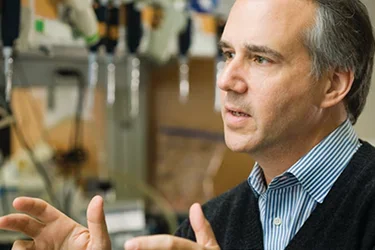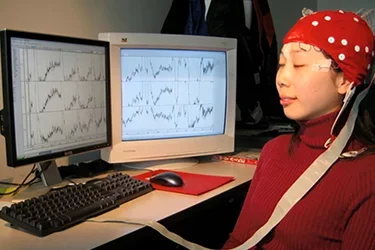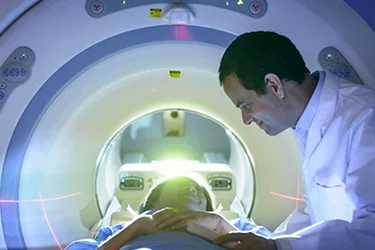Biology of Autism
Biology of Autism
Pioneers In The Genome Sequencing Of ASD

Today, ASD is thought to have many different causes, including substantial genetic factors, and in some cases, perinatal factors, both of which are thought to act during the development of the fetus during pregnancy.
UCLA researchers have made significant discoveries about genes and continue to pioneer approaches to accelerate the pace of this painstaking research. From 2000 through 2005, these scientists and their collaborators performed the largest genome scan of families with a child having autism and identified several genes potentially associated with the disorder.
This work continues through today as:
- UCLA researchers conduct whole genome sequencing in nearly 10,000 individuals with ASD
- Identifying gene mutations
- Demonstrating how those mutations disrupt brain functions
- Using knowledge gained to provide drug developers with targets to correct the faulty mechanisms
- Developing ideas about behavioral interventions to help patients compensate for deficits
“ ”
It's likely that many hundreds of gene mutations might be involved in ASD in the population, but how they combine in an individual is not yet known. Dr. Geschwind is now leading research to overcome this obstacle by mapping known gene mutations and looking for common neural pathways that are affected. His research so far strongly suggests there are specific pathways that become disrupted in people with the disorder.
"If there are going to be 500 to 1,000 mutations in autism, am I going to have to come up with 500 to 1,000 new treatments, or are there common pathways that coalesce?" he says. "For example, with cancer, a lot of different mutations affect key components of the cell cycle; how cells contact each other; or how cells divide. So the question is: Are there are common pathways that would be analogous to that in autism? Rather than studying one gene at a time we're trying to ask: Do these genes converge on specific pathways?"
As various molecular pathways linked to ASD are identified, UCLA researchers will attempt to group patients by these characteristics and apply therapies that address the underlying brain abnormalities.
Pioneering Work
Due to contributions from UCLA's researchers, advances in the world's understanding of autism have soared. The newly formed Institute for Precision Health holds the promise of advancing that knowledge further.
They will test the relationship between new gene variants and other emerging diagnostic methodologies, including eye-tracking, electroencephalography (EEG) and neuroimaging autism. The data will converge to improve ASD diagnosis and help predict autism treatment response.
ASD is a heterogeneous disorder — meaning that distinct genetic factors likely cause various forms of the disorder in different subgroups of people. While the early genetic studies were performed in people of European descent, Dr. Geschwind is now leading a genomics study, the only one of its kind in the world, to look for gene mutations more commonly found in African-Americans and other ethnic groups. Moreover, some of the same genes that cause ASD might also contribute to attention deficit hyperactivity disorder (ADHD) and schizophrenia. Genetic studies will help explain how those different disorders converge.
Unanswered Questions
"There are a lot of very important questions in autism that still need to be answered," he says. "One of the biggest is identifying the causes of autism, which is mostly genetic. We're beginning to nail that down and should have a much more complete understanding within the next decade."



